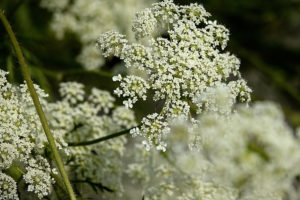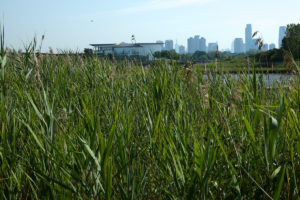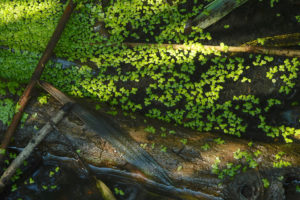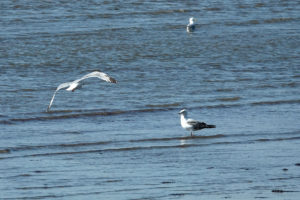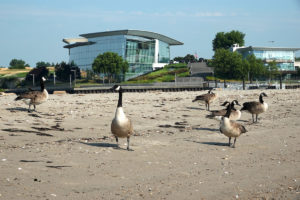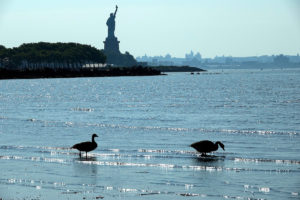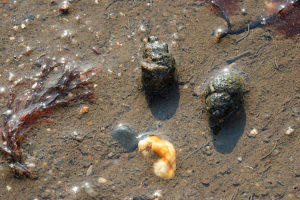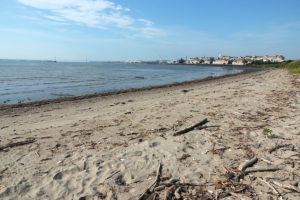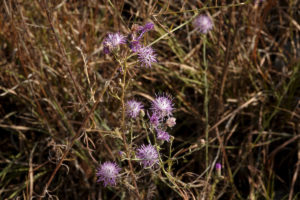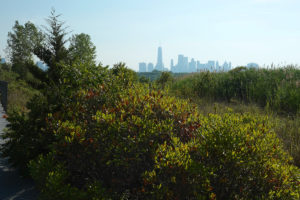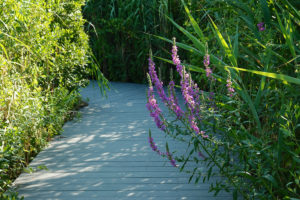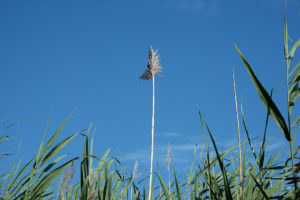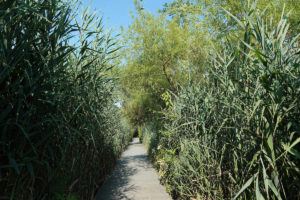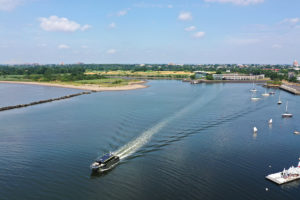 Liberty State Park again at center of controversy over development
Liberty State Park again at center of controversy over development
The half-mile stretch of Caven Point beach seems fairly ordinary, as beaches go.
Birds fish in the flats and perch in the reeds, their calls the only sound breaking the silence of this nature preserve inside Liberty State Park. Snails called mud dog whelks that look like rocks tumble around the water’s edge. Seaweed scattered by the tides dries in the sun.
But Caven Point is far from ordinary.
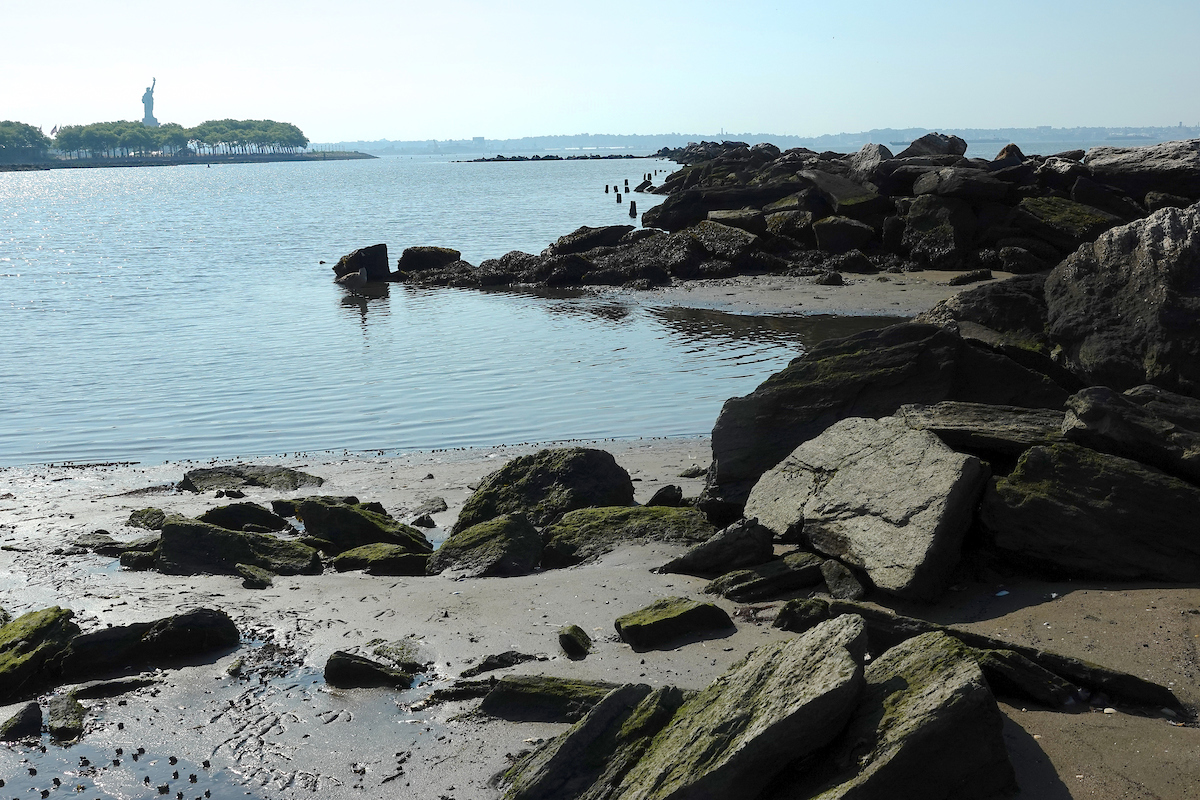
Jersey City, NJ 07/21/22. The jetty at Caven Point in Liberty State Park, an important area for migratory birds, whose footprints can be seen in the wet sand. Danielle P. Richards / New Jersey Monitor
Its shoreline is the longest uninterrupted stretch of natural beach in the Upper New York Bay and Hudson River. Its location—along the Atlantic Flyway and within the harbor estuary—has made it a favorite stop for migrating birds, including several endangered species. And it is again at the center of a battle between preservationists, state lawmakers, and a billionaire golf course owner.
Lorraine Freeney was among the first in line fighting to protect this ordinary, extraordinary beach.
The avid birder, who launched a Facebook group for fellow bird-lovers and started documenting the area’s avian population, this year became an unexpected lobbyist, calling and emailing her local lawmakers to implore them to protect Caven Point and other parts of the 1,200-acre park from developers who have proposed building arenas, athletic fields, and more here.
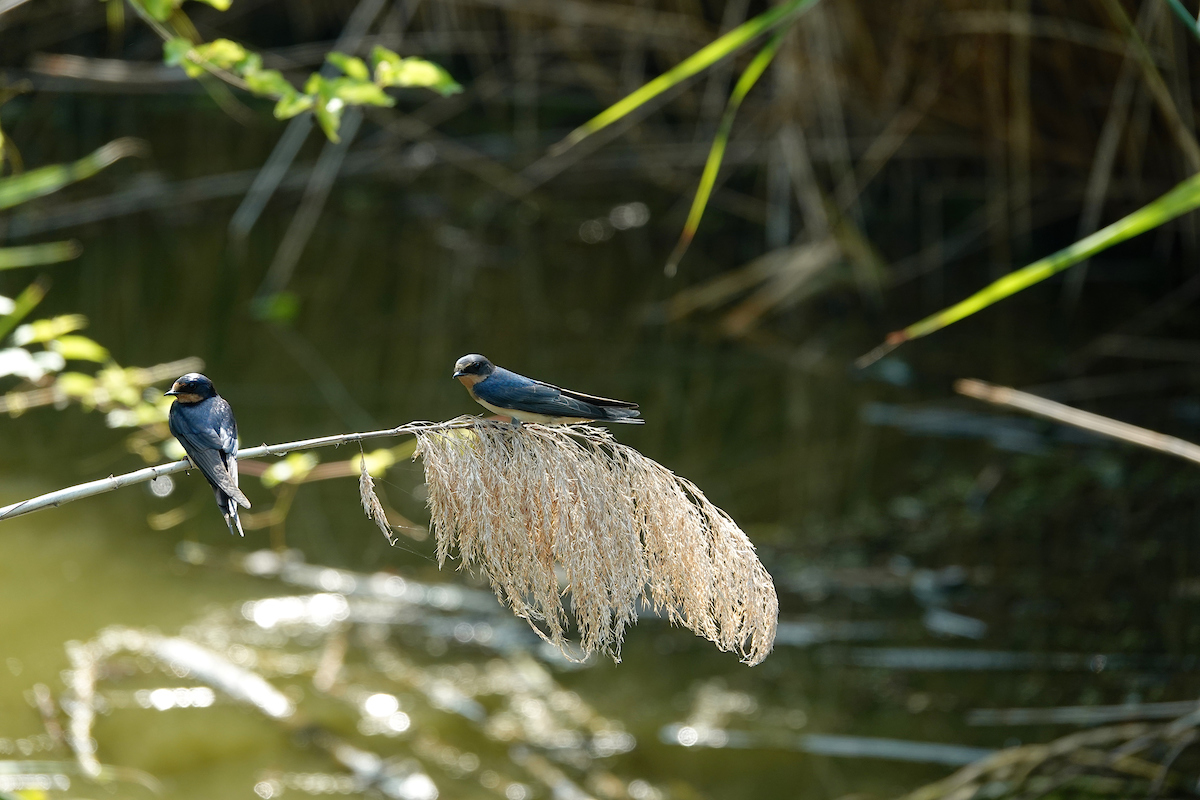
Jersey City, NJ 07/21/22. Two barn swallows perched on a phragmites along Caven Creek, in Liberty State Park, an important area for migratory birds. Danielle P. Richards / New Jersey Monitor
In one of the most densely populated parts of the state, Caven Point offers urbanites a close-to-home opportunity to see horseshoe crabs, endangered birds, and sometimes even harbor seals; comb the shore for shells; and learn firsthand about pollution, climate change, and habitat preservation, Freeney said.
“Caven Point is not just for hardcore birders—it’s for everyone,” Freeney said. “To have a beautiful public space and such an important educational resource on our doorsteps is a gift. Caven Point is one of a kind, and if it’s destroyed, there’s no bringing it back.”
A fast-tracked law
Caven Point has become a flashpoint in the fight against development in Liberty State Park. Environmentalists and park supporters have fended off efforts to commercialize more parts of the park almost since it opened in 1976 in Jersey City, across the New York Harbor from Manhattan. Aside from a marina, two restaurants, and a few other businesses, Liberty State Park is home mostly to passive parkland.
In recent years, their attention has been on billionaire Paul Fireman, who owns the luxury golf course next door.
Fireman backed off plans in 2020 to expand his golf course into a 22-acre section of Caven Point after the public revolted. But last month, when state lawmakers fast-tracked legislation creating a task force to recommend redevelopment of the park and allocating $50 million to fund it, critics suspected Fireman was the force behind it all.
He has said nothing publicly about any new plans and did not respond to the New Jersey Monitor’s request for comment. But his company lobbied for the bill, Politico reported, and his attorney attended several recent public hearings on it.
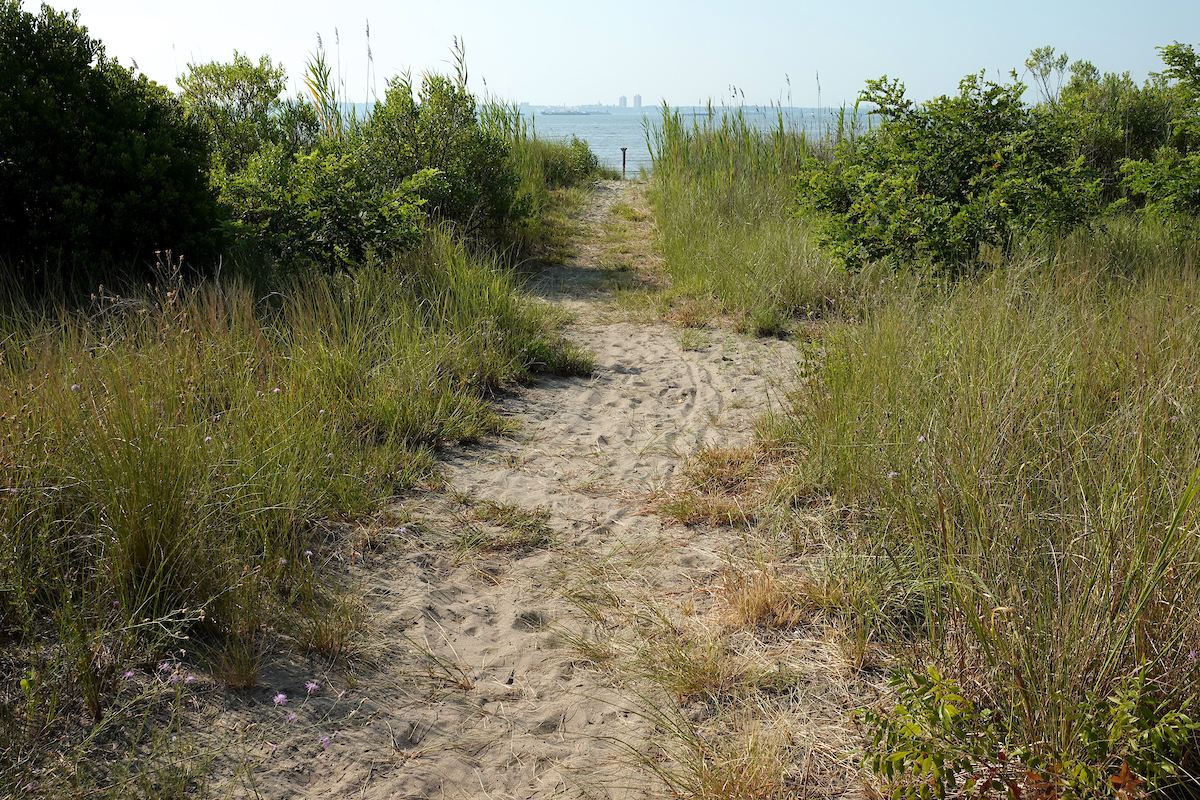
Jersey City, NJ 07/21/22. Beach trail at Caven Point in Liberty State Park, an important area for migratory birds. Danielle P. Richards / New Jersey Monitor
“We’ve seen powerful people dance, and we’ve seen people on our side switch to the other side, breaking our hearts, all because this guy has enough money to influence folks. And obviously he’s not alone. He’s one of many,” said Greg Remaud of the NY/NJ Baykeeper.
Remaud, Freeney, and other park preservationists pushed for lawmakers to amend the law, which Gov. Phil Murphy signed in late June, to carve out Caven Point for special protection. They refused.
Just before the Legislature recessed for the summer, Sen. Brian Stack (D-Hudson), who sponsored the development bill, instead followed up with another bill that would preserve Caven Point.
But that bill, which has yet to receive a committee hearing, did little to appease skeptics.
“If lawmakers want to protect Caven Point so badly, why didn’t they include it in the task force bill?” said Alex Ambrose, a policy analyst with New Jersey Policy Perspective who has advocated for the park’s preservation. “We would be glad to be proven wrong.”
What’s at stake
Caven Point can be hard to find in a state park whose jagged boundaries seem to have been drawn by a toddler.
Situated on the park’s southern end, near a gated community called Port Liberte and Fireman’s Liberty National Golf Club, the peninsula is a sprawling wilderness of wetlands, with the beach on one side, a paved path on the other, and a winding boardwalk and nature trails connecting the two.
It used to be a popular hangout for skinny-dipping locals who dubbed it Bare Ass Beach.
It’s been more serene in the spring and summer since the state closed it off to the public from April through September, except for occasional guided tours and classes, to protect migratory birds’ nests. Thousands of birds flock there, including endangered and threatened species like peregrine falcons and American kestrels.
Mandy Edgecombe has been a fan of Caven Point since 2011, when she interned as a park naturalist and began leading kayak tours there.
She’s always been baffled by the demands for development there, noting the critical role the area plays as the harbor’s last remaining salt marsh.
“If a storm happens, Caven Point is going to absorb so much water and so much storm surge energy because that’s what salt marshes do,” Edgecombe said. “Caven Point will literally protect the golf course from being flooded, so it makes no sense to me why they would want to do anything to it.”
As a tour guide, she barely had enough time to recount all the various species kayakers could encounter there.
“Estuaries are the nurseries of the sea, and salt marshes are where they have their babies in that nursery of the sea,” she said. “Salt marshes have more diversity than the Amazon rainforest.”
Preservationists are counting on the park’s history to help protect the peninsula from development now. The state bought Caven Point with 1978 Green Acres bond funds. That restricts the site’s use to public recreation and conservation.
But supporters think education can help save Caven Point too, which is what drives Edgecombe, Freeney, and others in their advocacy.
“There is a lot of anger and frustration with what’s been happening at Liberty State Park, and a feeling that it is being privatized and parceled off in direct opposition to what most people of Jersey City actually want,” Freeney said. “There are certainly ways that Liberty State Park could be improved, but destroying or selling off Caven Point is not one of them.”
This story was produced in collaboration with CivicStory and the NJ Sustainability Reporting project.
